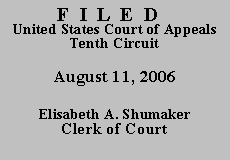

| UNITED STATES OF AMERICA, |
|
On April 9, 2004, Mr. Ramos was arrested by an United States Border Patrol agent near Lordsburg, New Mexico. After questioning by the agent, Mr. Ramos admitted that he was a Mexican national who had illegally entered the United States. A further review of his records showed that he had been deported from the United States four times.
According to the Pre-Sentence Report ("PSR"), Mr. Ramos' criminal history category was IV and his total offense level was 21. See Aplee. Supp. App. at 7, 10. This combination rendered Mr. Ramos' United States Sentencing Guidelines ("Guidelines") range at 57 to 71 months. Mr. Ramos objected to this range, and requested that the district court depart downward because his criminal history category "over-represent[ed] the seriousness of his previous conduct." Id. at 2. Following a sentencing hearing, the district court disagreed with Mr. Ramos' characterization of his guideline range, and sentenced him to a term of 57 months. This appeal followed.
On appeal, Mr. Ramos contends that because the information charged him with a violation of 8 U.S.C. § 1326(a)(1), (2), and that crime carries a maximum penalty of 24 months, the district court erred in sentencing him to a 57 month term of imprisonment. As Mr. Ramos failed to raise this issue before the district court, our review is for plain error. United States v. Visinaiz, 428 F.3d 1300, 1308 (10th Cir. 2005). Thus, Mr. Ramos must demonstrate that the sentence contains (1) error, (2) that is plain, and (3) that the error affects substantial rights. Id. If this is shown, we may exercise discretion to correct the error only if it "seriously affects the fairness, integrity, or public reputation of judicial proceedings." Id. (internal quotations omitted); see also United States v. Lott, 310 F.3d 1231, 1241-42 (10th Cir. 2002).
As mentioned above, Mr. Ramos argues that he could only be sentenced to a 24 month term of imprisonment because the information charges him with a violation of 8 U.S.C. § 1326(a). The government disagrees, contending that because Mr. Ramos qualified under § 1326(b)(2) as one who was removed following an aggravated felony, he could be imprisoned to a maximum of 240 months, as that subsection indicates. Mr. Ramos' argument is without merit.
While it is quite true that the charging document (whether an information or an indictment) must set forth each element of the crime that it charges, it "need not set forth factors relevant only to the sentencing of an offender found guilty of the charged crime." Almendarez-Torres v. United States, 523 U.S. 224, 228 (1998). As the Supreme Court has instructed, and the government contends here, it is clear that § 1326(b)(2), the statutory provision of import here, sets forth "a sentencing factor . . . and not a separate criminal offense." Id. at 235. Accordingly, as it does not set forth a separate crime, "neither the statute nor the Constitution" requires the government to include that Mr. Ramos was going to be sentenced in accordance with § 1326(b)(2) in the information. Id. at 226-27.(1) There is no error here, plain or otherwise.
AFFIRMED.
Entered for the Court
Paul J. Kelly, Jr.
Circuit Judge
*. This order and judgment is not binding precedent, except under the doctrines of law of the case, res judicata, and collateral estoppel. This court generally disfavors the citation of orders and judgments; nevertheless, an order and judgment may be cited under the terms and conditions of 10th Cir. R. 36.3.
**. After examining the briefs and the appellate record, this three-judge panel has determined unanimously that oral argument would not be of material assistance in the determination of this appeal. See Fed. R. App. P. 34(a); 10th Cir. R. 34.1(G). The cause is therefore ordered submitted without oral argument.
1.The government asserts that it is "undisputed" that the Magistrate Judge informed Mr. Ramos that the maximum penalty was imprisonment for two years, apparently at the plea colloquy. Aplee. Br. at 7, n.12. Nevertheless, as the government also points out, this does not constitute plain error. See United States v. Dixon, 308 F.3d 229, 235 (3d Cir. 2000) (holding that a Rule 11 error did not satisfy plain error review because the defendant "never clearly and unmistakably asserted that had he been correctly informed of the sentence he would, in fact, have pled not guilty and gone to trial") (emphasis in original).